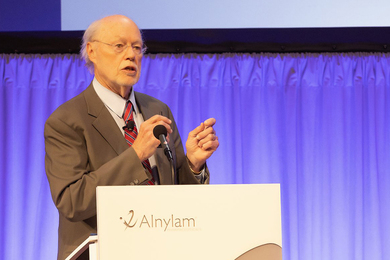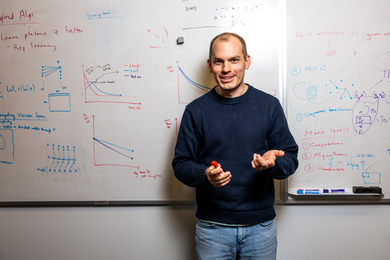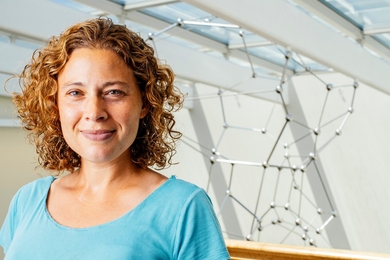Let’s say country X is sitting on an abundance of oil reserves. If its institutions are strong and stable — think Norway — then society will benefit. If, on the other hand, its institutions are precarious — think Nigeria — then this resource will lead to negative outcomes, such as weaker democracy, less economic growth, and more corruption. Right?
Well, yes … and no. According to political economist Renato Lima de Oliveira, a PhD candidate in the Department of Political Science, it’s more complicated than the "resource curse" literature reflects: Those natural resources, he says, can actually influence how institutions are built.
In the case of state-owned companies producing oil that is easy to extract, with a large margin between the cost of production and the selling price (known as low-cost oil), most of the profits go to government. And rather than invest in infrastructure and human capital, individuals in government invest in staying in power — by coopting or repressing the opposition, say, or by pouring money into pet projects. There’s no incentive to reform policies, Lima de Oliveira explains.
On the other hand, high-cost extraction, which is needed for offshore oil, changes the politics and leads to more productive investments — in technical capabilities, training of workers, and meritocratic staffing of oil companies (rather than patronage). “It becomes an incentive to be more professional in the way you handle your natural resource sector,” he says.
To test his theory Lima de Oliveira studied three countries — Brazil, Malaysia, and Mexico — with remarkably similar levels of institutional development (neither as high as Norway's nor as complicated as Nigeria’s) and per capita GDPs, but with different geological endowments. Whereas Mexico’s oil has been historically easy to exploit, reserves in Brazil and Malaysia require a much higher-cost, more technically complex method of production. This dissimilarity enabled Lima de Oliveira to show that different geological endowments have different political and economic impacts.
For example, it was the limited nature of Malaysia’s oil reserves and high extraction cost, rather than healthy institutional constraints, that created incentives for policymakers and Petronas, the national oil company, to both develop local suppliers and internationalize and develop reserves outside the country. “Malaysia has been successful in attracting investment in the country to develop a complex supply chain and in going abroad,” Lima de Oliveira explains, even without reforming its institutions to be more like Norway’s. “It’s not just about good institutions, or transparency, or insulation from political use of the oil company. … It’s also about the incentive that comes from a geological challenge.”
The other effect, he says, is that where production cost is higher, the impact of oil on society comes from more than just the price per barrel. It comes from the production itself — the capital goods and services needed to output that barrel.
Lima de Oliveira is quick to highlight the policy implications, such as the fact that the oil and gas industry can drive the development of human capital and industrial capabilities. A business reporter before studying political science, he covered oil in his native Brazil. There, he noticed that “one of the things … that becomes political is not just how you spend the oil money, but how you design the rules of procurement: Who is going to be the supplier of the oil platform, the tankers? When a state got an investment to build a shipyard for the oil industry, that state had to invest a lot to raise the quality of local human resources — creating new university courses, technical schools, and so on.” Countries that have to engage in more technically complex development of resources tend to invest more in technology, support infrastructure, and the development of local supply chains.
Another spillover effect in Brazil was that large oil companies are required to allocate 1 percent of their sales to R&D. As a result, universities are working not only on ways to improve the oil industry, but also to develop biofuels, carbon storage, and solar and wind energy.
As Lima de Oliveira did his fieldwork and research, his journalism experience stood him in good stead. “Approaching sources, understanding potential biases, knowing how to triangulate different sources of evidence, it’s kind of second nature for me,” he says. “It really helps when you’re trying to get a lot of information to know how credible it is.”
Lima de Oliveira loves to delve deeply into a single topic and develop a theoretical framework to explain what he observes — something he couldn’t do as a journalist. A former MIT Energy Fellow, he’s read extensively about the geology of each country he studies. “The great thing about being here is the discussions about the energy sector and having friends who are petroleum engineers. I can enter into a dialogue with them about my hypotheses.”
He values not only the technical knowledge and rigorous political science training MIT offers, but also the “deep appreciation about the policy implications of what this work means to the world.” He’ll keep that connection going when he moves to Kuala Lumpur this year to join the faculty of the Asia School of Business, a collaboration with the MIT Sloan School of Management.
"The work I do influences the way policymakers see the issues they face," Lima de Oliveira says. "When you think about the oil industry there’s an industry behind it. It’s not just rents, not just money flowing easily. How can we develop this industry to best fit our domestic capabilities?”








